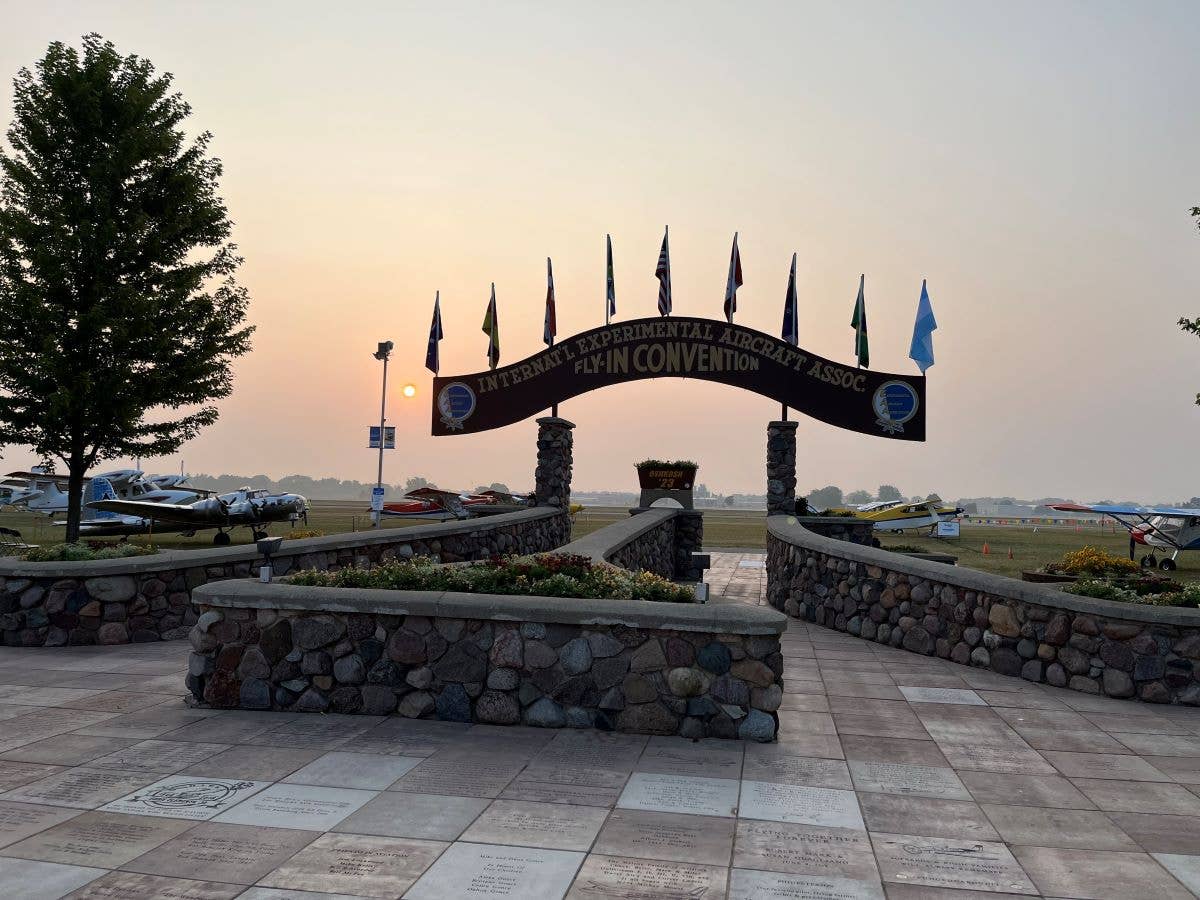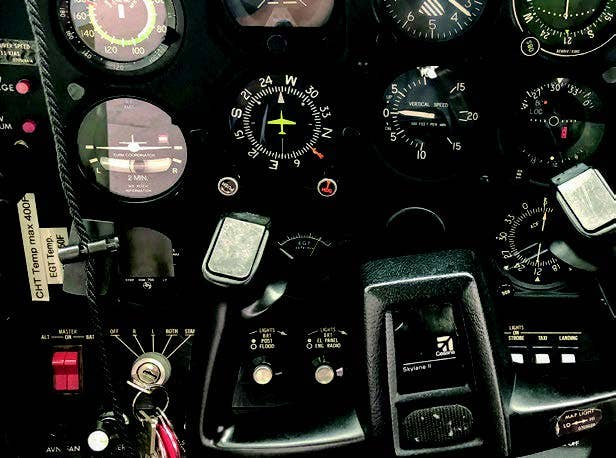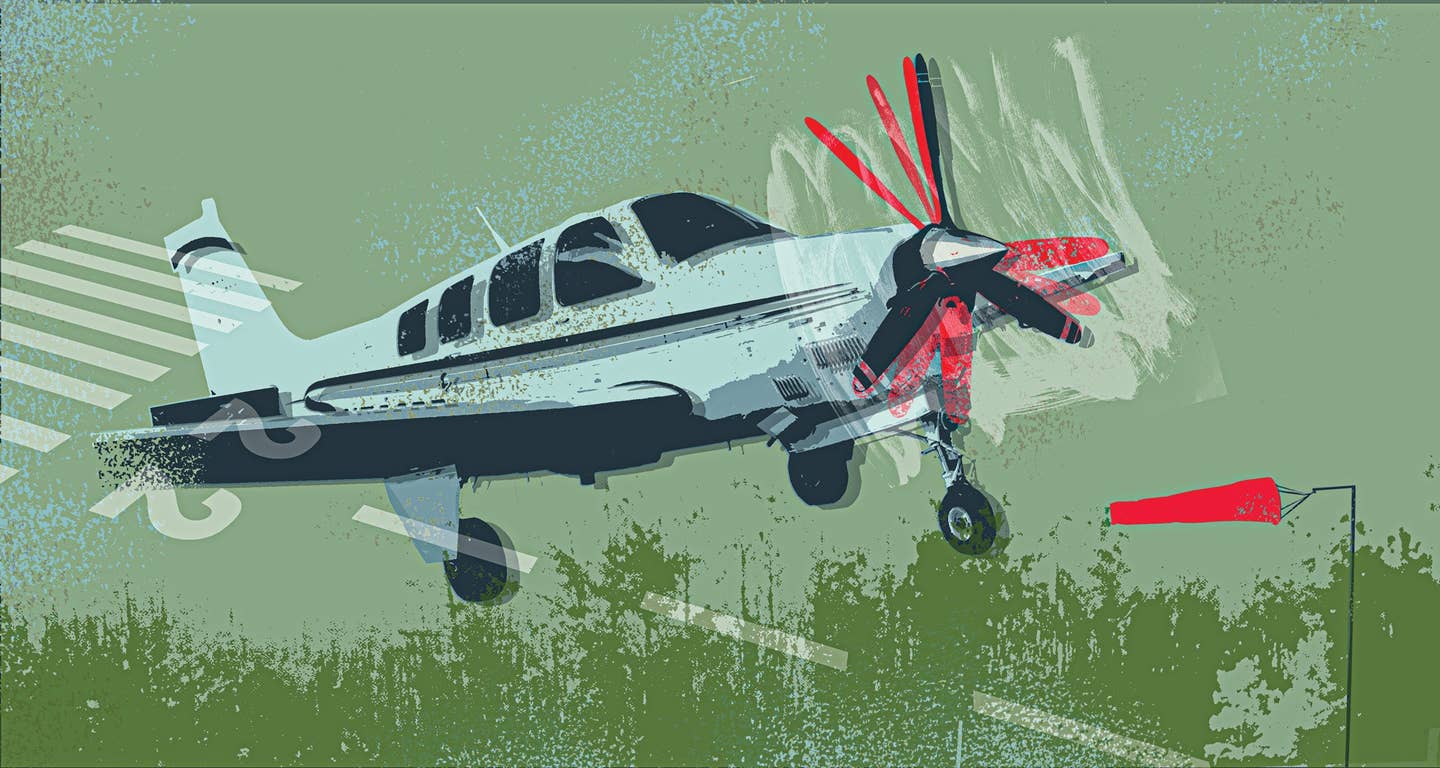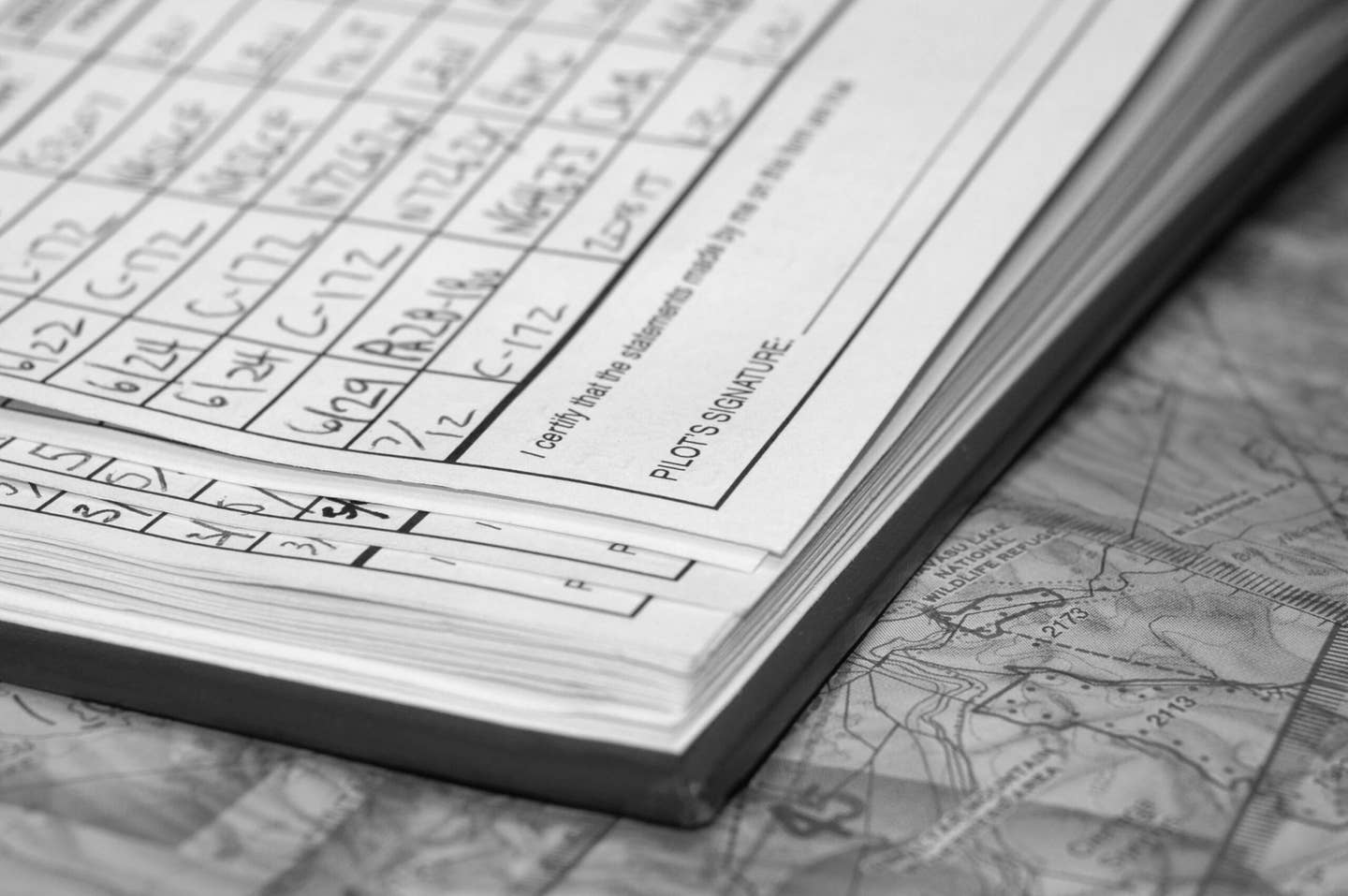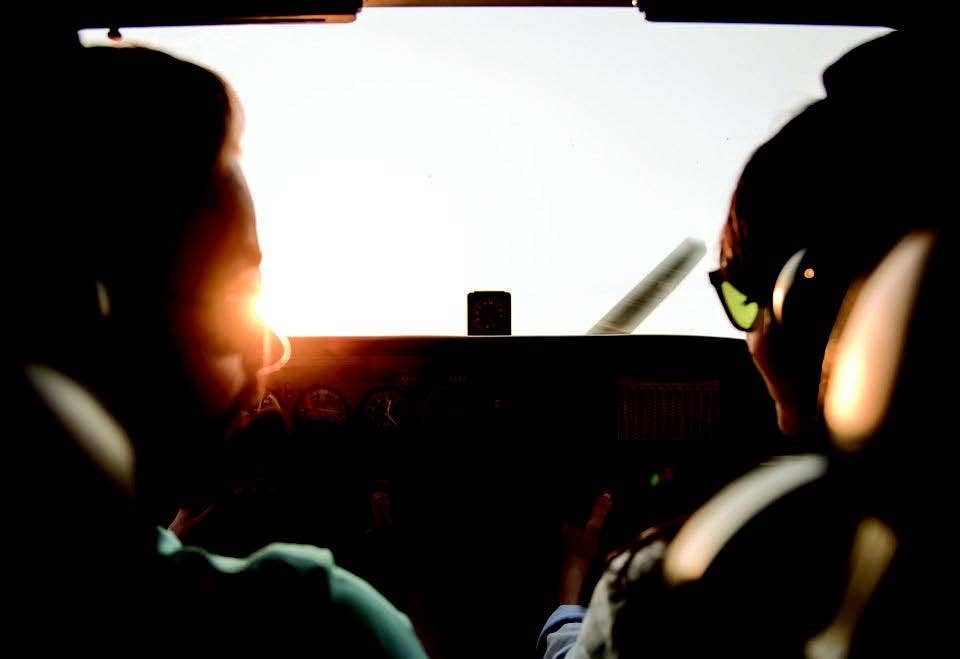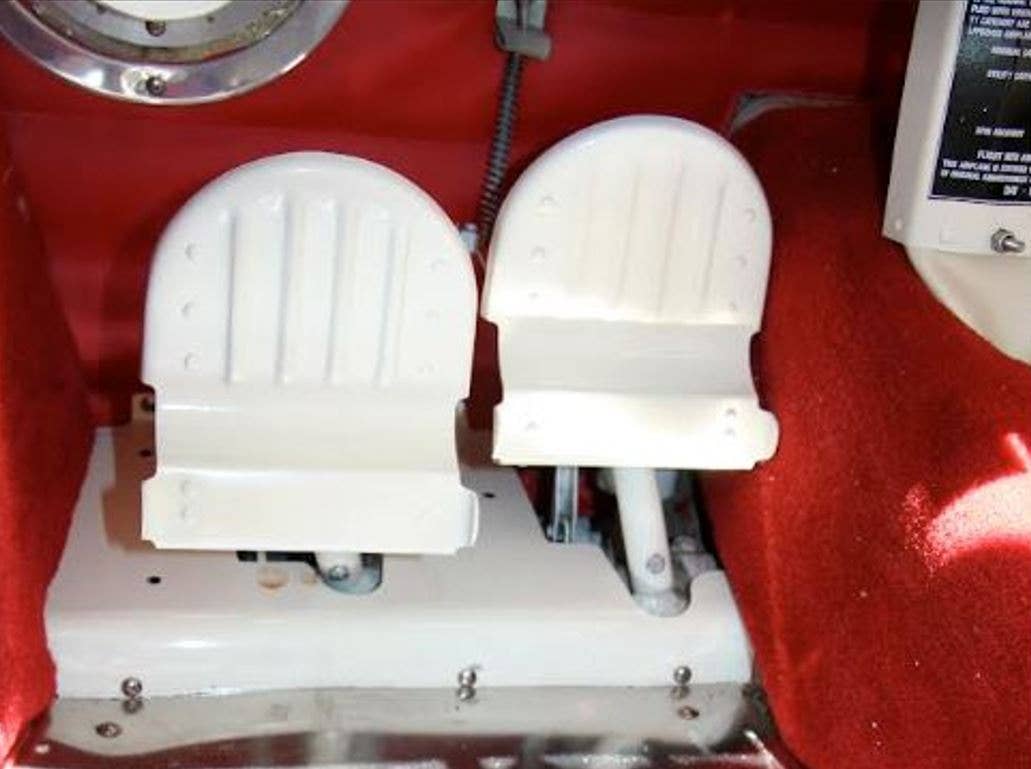
The TWA Flight Center at JFK was designed by Eero Saarinen and opened in 1962. Sam Weigel
It’s a rainy, blustery October night in New York City, and the lineup for takeoff here at Kennedy International looks to be a good mile long. Lots of heavy metal around, much of it headed across the pond with us. We’re the “light twin” of the bunch in our Boeing 767-300ER. I’m in the right seat and will be the flying pilot to Frankfurt, Germany, an attaboy from the skipper after serving as relief pilot for the first two crossings of this six-day trip. I glance across the cockpit and see JetBlue’s Terminal 5 through the captain’s rain-streaked windscreen — and peeking out from behind it, the real Terminal 5, the 1962 modern masterpiece that famed architect Eero Saarinen sculpted for Trans World Airlines shortly before his untimely passing. It’s still beautiful and timeless, even shunted away behind the modern airport-in-a-box dreck. The first time I saw it, on my first visit to JFK at the age of 19, the sheer audacity of T5 literally took my breath away. It looked like a UFO, its glowing glass edifice shimmering across a rain-slicked ramp much like this one. I’d never been so proud to be an unpaid intern for a bankrupt airline.
That was the spring of 2001; the 9/11 attacks were a few months away.
I was working in TWA’s Training Systems Development office and was using my newfound jumpseat privileges to travel every weekend, staying in flea-bitten hostels to conserve my scant remaining dollars. A few fellow interns and I were planning to go to Paris for the weekend, but that fell through, so on a whim I decided to see just how far I could go and still get back in time for work on Monday morning. That turned out to be Cairo, Egypt; mind you, I’d never been outside of North America. In New York, I boarded a 767 and introduced myself to the captain.
Charlie Parker (like the jazz musician) was a slim, handsome and gregarious 58-year-old finishing up the last few years of a long career at a once-proud airline. He welcomed me warmly and helped me get comfortable in the big Boeing’s second jumpseat.
I glanced at the overhead fuel panel and was shocked to see a figure of 130,000 pounds — 34 times heavier than the largest airplane I’d yet flown. The takeoff roll was interminably long; I sat wide-eyed as Runway 31L grew shorter and shorter, then finally disappeared under the nose as Charlie ever so gently nursed the heavy ship off the ground. The floodlit Twin Towers dominated the view of lower Manhattan, and then we turned out over the Atlantic. It was a full flight, meaning I was stuck in the cockpit for the duration. Charlie insisted I bed down in a nest of first-class blankets on the cockpit floor to try to get some sleep, much to the consternation of the flight attendants who occasionally entered to take a break from the pax and see if “the boys” needed anything. It didn’t matter. I couldn’t sleep; I was much too excited.
If there’s one flight I can point to and say, “That’s when I decided to be an airline pilot,” this is the one. The crackling static of the HF radio as the pilots called Gander, Shanwick and Santa Maria in turn with our position reports fired my imagination. At sunrise, the relief pilot headed to the lav and Charlie invited me to sit in the right seat, and for the first time, the “big iron” seemed within reach. We coasted in over Portugal and Spain, and as I looked down on Mediterranean villages stirring to life far below, “over there” became real to me for the first time. I felt a new and deep compulsion to see those villages, to explore new lands, to experience foreign cultures. On approach into Cairo, the crew asked for and received a long visual approach, and they dipped down low — probably lower than technically legal — over the Great Pyramid of Giza. I felt like I could reach down and pat the Sphinx on the head. Once we landed, a kaleidoscope of sights and sounds greeted me: Strange Russian airplanes were scattered engineless around the airport, brusque customs officials wanted to know my business in the Arab Republic of Egypt, stern-looking guards brandished very serious-looking machine guns, and the great press of humanity shouted varied entreaties in strange tongues outside the arrivals area.
Charlie invited me to share the crew bus downtown. It was late afternoon, and I sat with my nose pressed to the glass, watching the teeming, honking rush-hour throngs. Golden sunlight slashed across endless rows of concrete tenements interspersed with towering minarets. The Nile River came into view, sparkling and rolling steadily northward. Presently the bus pulled up outside the Hilton Tahrir Square, where a decade later the world would watch as the underlying tensions of Egyptian stratocracy boiled to the surface in dramatic and violent fashion.
“What is your plan?” the first officer queried pointedly as the rest of the crew signed in for their rooms. Earlier, Charlie had invited me to stay with the crew for their entire three-day layover, including planned visits to Giza and Alexandria. But I had almost nothing in my bank account, and had no idea how to get ahold of my boss to beg out of work on Monday. I declined the invitation — something I still regret. Instead,
I planned to meet the outbound crew at the hotel in eight hours. I mumbled something about walking along the Nile and visiting the antiquities museum and finding some back-alley hostel to crash in for a few hours. I was utterly fried from the 12-hour flight, and it showed. The first officer was upset. “Wake up, kid. You’re in the Third World here. You can’t just show up without a plan, they’re going to smell you from a mile away.” He was a bit harsh, but I knew he was right.
Charlie had previously told me that poolside cabanas at the Hilton were only $50, and I could sleep there as long as I needed. I had demurred, $50 being a significant portion of my life savings just then. Now he approached from the check-in desk and held out a key. I tried to protest, but he shut me down. “Look, Sam, you’re a bright young guy, and I fully expect to see you in the left seat someday. When you’re there, I want you to remember this lesson: Always, always take care of your crew, no matter what.” He pressed the key into my hand. In that moment, Charlie Parker pretty well sealed my fate as an airline pilot for life.
I slept like the dead, took a short walk along the Nile, met the outbound crew and flew back in time for work on Monday. My boss was aghast that I hadn't stayed longer, work be damned. Seven years later, I upgraded to captain of an Embraer 175 regional jet. Charlie's words frequently echoed in my ear, and I did my best to take care of my humble crew of one first officer and two flight attendants. Every time I met an ex-TWA pilot I asked about Charlie, and later Googled him to no avail. And then one day about two years ago, I got a call out of the blue. Charlie had seen my mention of him in these pages and got my contact info from Flying's editorial staff.
“You probably didn’t find me because I had another name for much of my career,” Charlie explained.
Parker was the last name of his biological father, a heavy-bomber pilot during World War II who perished in that conflict while Charlie was yet in his mother’s womb. “My mother remarried, and my adoptive father was a good, kind man. He was the only dad I knew. But as I got older, I wanted to honor my biological father’s sacrifice. I decided to do so by carrying on his name.”
I told Charlie how deeply his words in Cairo had affected me at a young and impressionable age. He told me that he hadn’t been much older when he was hired by TWA in the early 1960s. “The captains then were all old World War II guys, like my dad. They had really seen some things, and it took a lot to scare them. Some of them could be pretty gruff.” Charlie told me a few stories of decidedly non-PC behavior that would get a modern airline pilot immediately fired into deep space. “But a lot of the captains really cared about us young guys, took us under their wing and showed us the ropes. What I told you in Cairo was really just one of ‘the Rules,’ as explained to me by one of the finest captains I ever flew with.” I waited for Charlie to expound.
“First, no matter what, you take care of your crew. Next, you take care of your passengers. Then, you take care of your airplane. And finally, after all that’s been done, you take care of yourself. But if you’ve done the first three, you’ll generally find yourself well taken care of.”
I was sweating and grease-stained in the bowels of Windbird when Charlie told me this, in a stifling hot boatyard in Charleston, South Carolina, and I broke out in goose pimples. It’s all there, what every prospective professional pilot needs to know for a long and successful career. It’s the Golden Rule lifted to the flight levels. It doesn’t guarantee that you won’t be downgraded or furloughed, of course, or that your once-proud airline won’t be stripped to the bone, bankrupted multiple times and sold out from under you. That’s all just noise; if it bothers you much, you should find another business. I’m talking about being the pilot who enjoys every day he or she’s allowed to grace God’s deep blue sky, who counts legions of friends scattered around the industry, whose crewmembers rejoice when they see him on their trip printouts. I’m talking about being the pilot who doesn’t mind going to work, because it’s not work — it’s home. I’m talking about being happy with who you are.
I’ve had a few long New York layovers lately, and I tried calling Charlie to get together on a few of them. His old phone number isn’t working, and I can’t figure out how else to get hold of him. He was a sprightly 73-year-old recently retired corporate pilot and skier the last time I talked to him, and he thankfully hasn’t appeared on any “flown west” lists yet. So call me, Charlie. I want to hear more about the “Golden Rules” your old captains passed on to you. We have a lot of young people coming into the airlines now, and they need to learn these things too.

Subscribe to Our Newsletter
Get the latest FLYING stories delivered directly to your inbox

